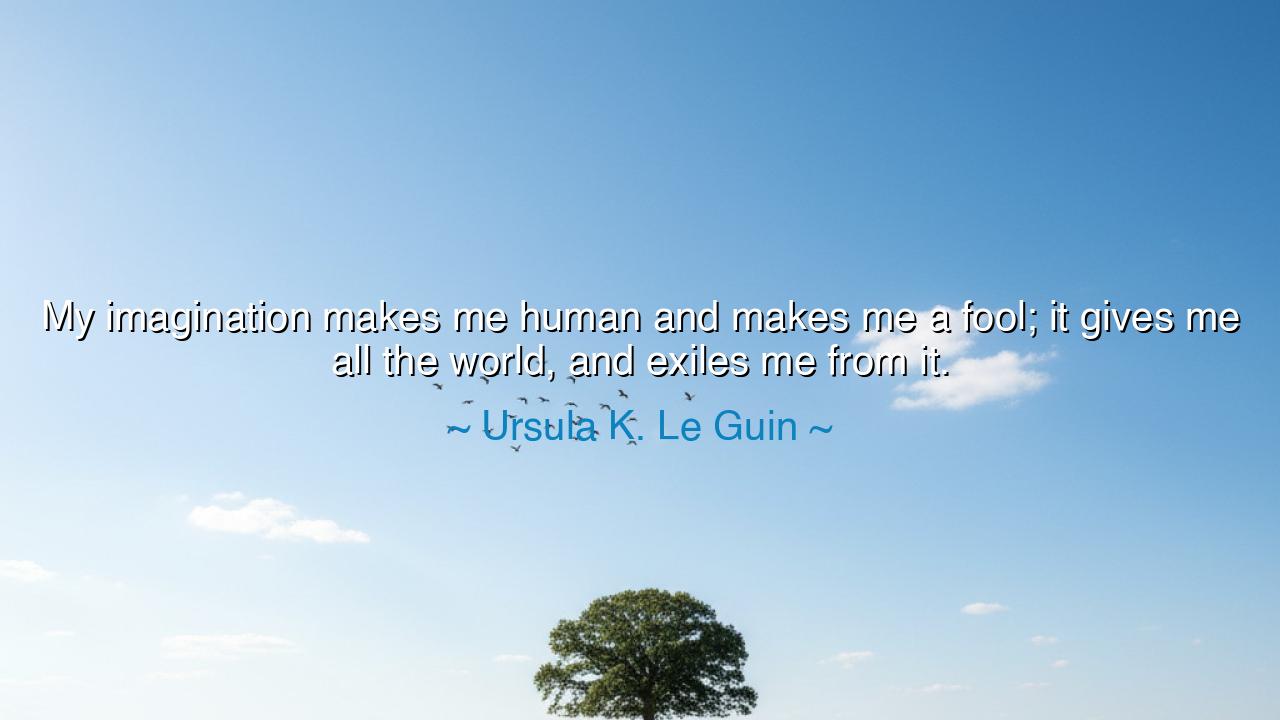
My imagination makes me human and makes me a fool; it gives me
My imagination makes me human and makes me a fool; it gives me all the world, and exiles me from it.






"My imagination makes me human and makes me a fool; it gives me all the world, and exiles me from it." Thus spoke Ursula K. Le Guin, the weaver of worlds and chronicler of human souls. In this one sentence, she captured the double-edged power of imagination, that sacred flame that both elevates and torments mankind. Her words are not merely poetic—they are the confession of every dreamer, philosopher, and creator since time began. For to imagine is to be more than flesh; it is to reach for the infinite. Yet in reaching, we discover our separation from the world we long to perfect. Imagination is both our crown and our cross: it makes us divine in vision, but lonely in reality.
Le Guin, whose stories bridged the seen and unseen, understood that imagination is the essence of humanity. It is what allows us to see beyond instinct, to dream beyond survival. The beasts of the earth live and die by the rhythms of nature, but man, endowed with imagination, builds temples, writes songs, and asks, “Why?” It is imagination that lifts us from the dust, that allows us to see the universe not as chaos but as creation. Yet, this same power condemns us to longing—for we see beauty we cannot always reach, perfection we cannot sustain, and worlds that exist only in the chambers of the mind. Thus, to imagine is to hunger, eternally, for something greater than what is.
Think of Icarus, the youth who imagined flight. His vision was holy—born of the same divine curiosity that drives every inventor and artist. Yet his wings, crafted by his father’s wisdom and his own daring, melted in the sun’s fierce truth. His fall reminds us that imagination makes us fools when it blinds us to our limits. And yet, would we wish him otherwise? For though he fell, Icarus touched the sky, and in doing so, gave all humanity the dream of flight. His failure was also his triumph. So too does Le Guin remind us that the folly of imagination is often the price of its glory. To be human is to dare, even when daring brings sorrow.
In her own life, Le Guin used her imagination to build worlds that questioned power, gender, freedom, and truth. Her Earthsea and Hainish universes were mirrors of our own, revealing both the potential and peril of the human heart. Through fiction, she walked the thin line between wisdom and folly—creating realms of beauty that made our world seem both richer and poorer. She knew the exile of the dreamer: that when one lives too much in worlds of the mind, the real world can seem dull, even cruel. Yet without those visions, reality would stagnate, colorless and cold. The creator is both blessed and banished by her own creation.
This paradox is not hers alone. Consider Vincent van Gogh, whose imagination painted light itself into motion. His eyes saw what others could not—the trembling soul of color, the living pulse of the stars. Yet this gift made him a stranger to the world. His imagination gave him all the world, but it also exiled him from it, for no one could yet see as he did. Only after his death did the world awaken to his vision. Such is often the fate of those who see too far ahead: their reward is immortality, their punishment solitude.
Le Guin’s wisdom, then, is a call to humility and courage. She tells us that imagination is not a gentle gift—it is a sacred burden. To possess it is to walk between two realms: one of dreams, one of flesh. The dreamer must learn to return, to live among others even after glimpsing eternity. The challenge is not only to imagine, but to translate imagination into compassion, into understanding, into life. To create, to love, to hope—these are the ways we reconcile the world we dream with the one we live in.
And so, my children of thought and wonder, take this lesson deeply: cherish your imagination, but be wary of its distance. Dream greatly, but remember to return home. Let your visions not lead you to despair that the world is imperfect, but to strive to make it more beautiful. Know that to imagine is both to rise and to fall, to see heaven and to walk through shadow. It is a divine foolishness, a necessary exile. Yet without it, we are not human at all.
For in the end, imagination is the soul’s proof of life. It grants us the power to shape reality, to find meaning in suffering, and to create beauty out of darkness. It gives us the world—every mountain, every ocean, every star—and yet reminds us that we stand forever on its edge, gazing outward, longing for more. This is the price and the glory of being human: to dream endlessly, even knowing that our dreams will always outgrow the world that holds them.






AAdministratorAdministrator
Welcome, honored guests. Please leave a comment, we will respond soon